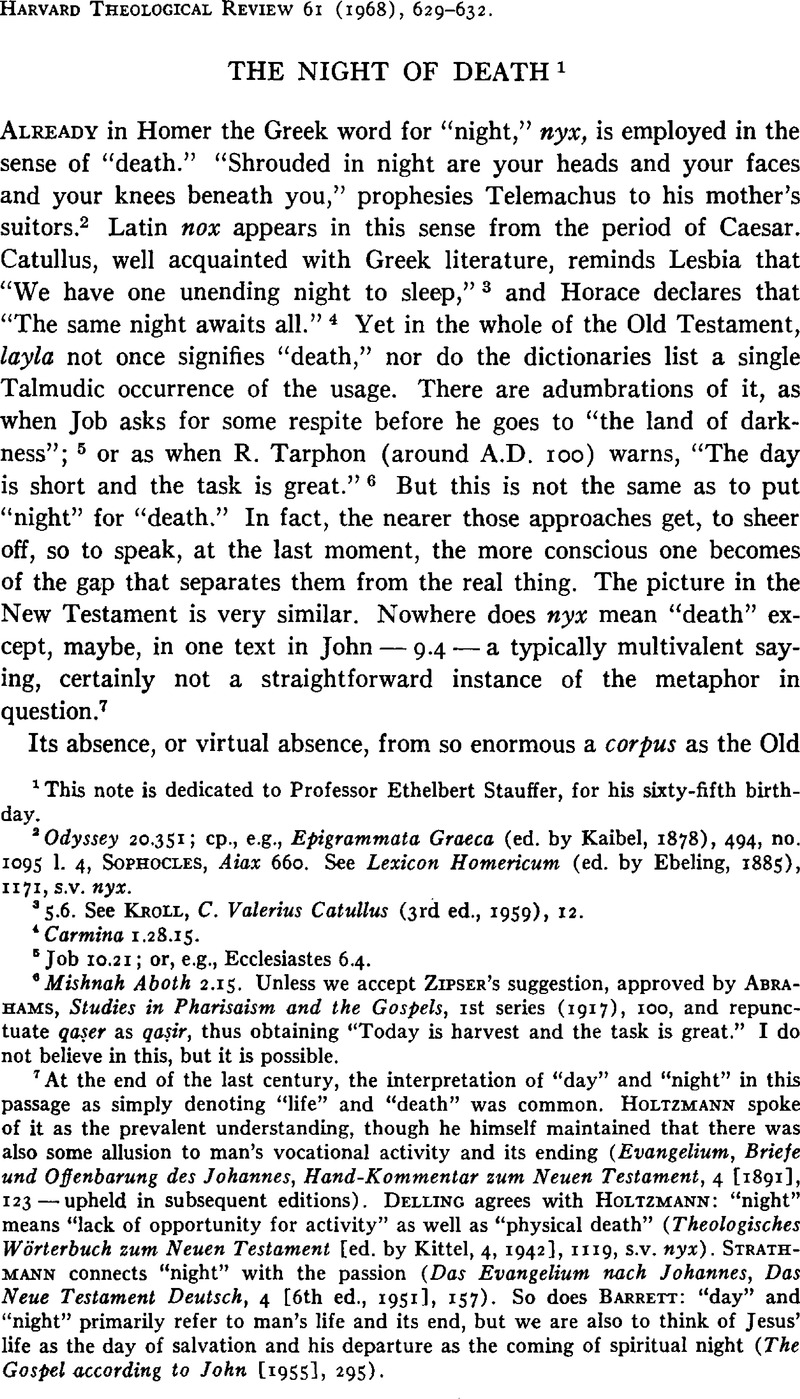Article contents
The Night of Death1
Published online by Cambridge University Press: 10 June 2011
Abstract

- Type
- Notes And Observations
- Information
- Copyright
- Copyright © President and Fellows of Harvard College 1968
References
2 Odyssey 20.351; cp., e.g., Epigrammata Graeca (ed. by Kaibel, , 1878), 494, no. 1095 1. 4Google Scholar, Sophocles, , Aiax 660Google Scholar. See Homericum, Lexicon (ed. by Ebeling, , 1885), 1171, s.v. nyxGoogle Scholar.
3 5.6. See Kroll, , C. Valerius Catullus (3rd ed., 1959), 12Google Scholar.
4 Carmina 1.28.15.
5 Job 10.21; or, e.g., Ecclesiastes 6.4.
6 Mishnah Aboth 2.15. Unless we accept Zipser's suggestion, approved by Abrahams, , Studies in Pharisaism and the Gospels, 1st series (1917), 100Google Scholar, and repunctuate qaser as qasir, thus obtaining “Today is harvest and the task is great.” I do not believe in this, but it is possible.
7 At the end of the last century, the interpretation of “day” and “night” in this passage as simply denoting “life” and “death” was common. Holtzmann spoke of it as the prevalent understanding, though he himself maintained that there was also some allusion to man's vocational activity and its ending (Evangelium, Briefe und Offenbarung des Johannes, Hand-Kommentar zutn Neuen Testament, 4 [1891], 123Google Scholar —upheld in subsequent editions). Delling agrees with Holtzmann: “night” means “lack of opportunity for activity” as well as “physical death” (Theologisches Worterbuch zum Neuen Testament [ed. by Kittel, , 4, 1942], 1119Google Scholar, s.v. nyx). Strathmann connects “night” with the passion ( Das Evangelium nach Johannes, Das Neue Testament Deutsch, 4 [6th ed., 1951], 157)Google Scholar. So does Barrett: “day” and “night” primarily refer to man's life and its end, but we are also to think of Jesus' life as the day of salvation and his departure as the coming of spiritual night (The Gospel according to John [1955], 295)Google Scholar.
8 Genesis 30.15. The usual translation is “to-night,” quite correct. The reason I put “for the night,” a more literal approximation to the Hebrew hallayla, is that the deeper meaning advocated by R. Simeon is deducible only if one proceeds from this starting-point. For the legal or semi-legal notions behind the Biblical story, see my Studies in Biblical Law (1947), 16ff.Google Scholar, and Concerning Methods of Bible-Criticism, in Archiv Orientdlni 17 (1949), 96ffGoogle Scholar.
9 Genesis Rabba 72 on Genesis 30.15.
10 Genesis 35.19f., 48.7.
11 Genesis 37.2.
12 Genesis Rabba 84 on Genesis 37.2.
13 A specimen from the ancient discussion of Homer is adduced in my essay Alexandrian Methods of Interpretation and the Rabbis, , Festschrift Lewald (1953), 29Google Scholar.
14 Genesis 4.15.
15 Genesis Rabba 22 on Genesis 4.15.
16 This is Driver's opinion: Notes on the Hebrew Text of the Books of Samuel (2nd ed., 1913), 213Google Scholar. He was, of course, unacquainted with the Rabbinic parallels.
17 Genesis 31.32. A legal discussion may be found in my Studies in Biblical Law (1947), 206ff.Google Scholar; the Rabbinic treatment of the episode is mentioned at 218f.
18 Genesis Rabba 74 on Genesis 31.32.
19 For an effect on his politics of resistance see my Collaboration with Tyranny in Rabbinic Law (1965), 37ffGoogle Scholar.
20 Babylonian Pesahim 112a.
21 Babylonian Meilah 17b. The reason for the choice is stated to have been the Rabbi's power of working miracles. No doubt this consideration did play a part.
- 2
- Cited by


